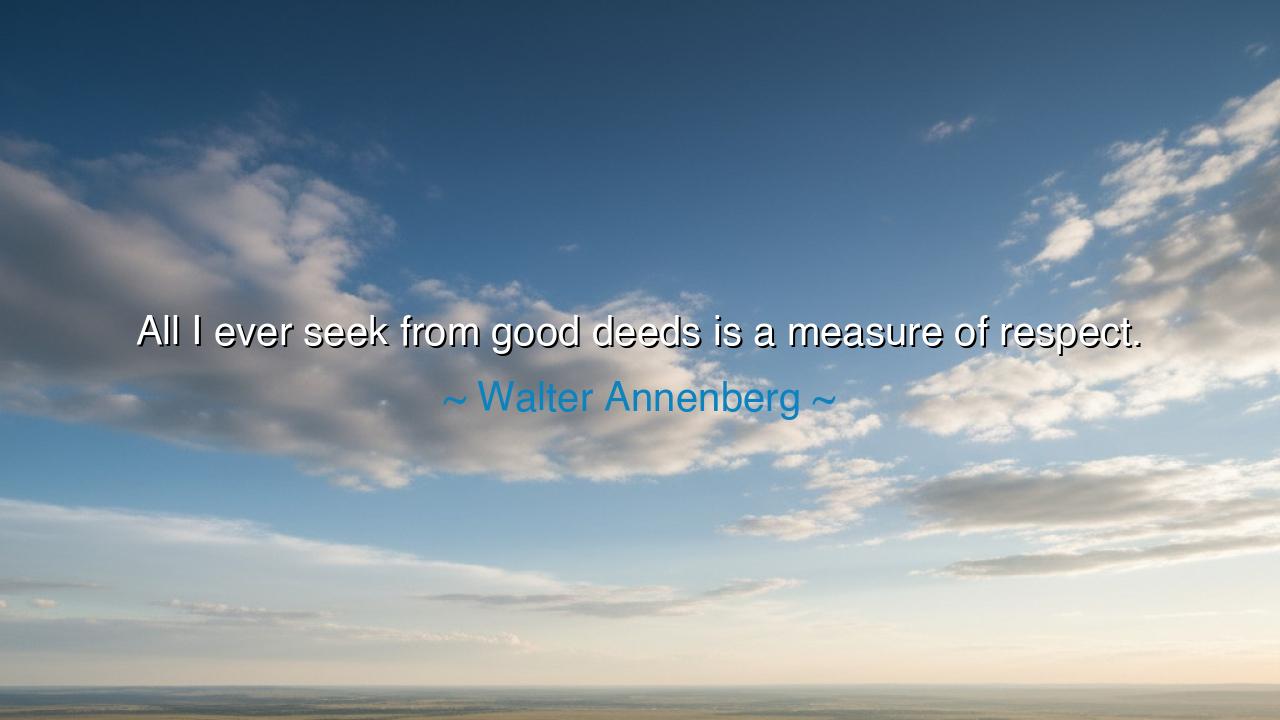
All I ever seek from good deeds is a measure of respect.






The words of Walter Annenberg—“All I ever seek from good deeds is a measure of respect.”—echo with the humility of one who understood the fleeting nature of wealth and power, and the eternal value of honor. To speak thus is to reveal a truth known to sages of old: that good deeds are not done for gold, nor for applause, nor for monuments of stone, but for the quiet dignity that comes when one’s actions earn the regard of others. In this, Annenberg places himself in the lineage of those who sought not glory, but the noble currency of respect.
The ancients often taught that deeds, not words, define a life. Temples crumble, riches vanish, but the memory of kindness, generosity, and integrity endures beyond the grave. When Annenberg, a man of great means and influence, declares that all he sought from his good deeds was respect, he strips away the illusions that cloud the hearts of many. He reminds us that to act rightly is reward enough, and that if anything returns to us from such acts, let it be the simple, timeless gift of being held in esteem by those who witness our integrity.
Consider the story of Marcus Aurelius, emperor of Rome. Though he commanded armies and ruled over vast territories, he wrote in his meditations that the only true legacy was to live with virtue. He cared little for statues raised in his honor, knowing they would crumble with time. What mattered was the respect of his peers and descendants, earned through justice, wisdom, and compassion. Like Aurelius, Annenberg recognized that respect—whether in life or in memory—is the one treasure that does not tarnish.
There is also a warning within his words. For too often, men perform good deeds not for goodness itself, but for recognition, for applause, or for the secret hope of advantage. Such deeds, though outwardly bright, are inwardly hollow. Respect cannot be bought with cunning or demanded by force; it must be freely given in response to sincerity. Thus, Annenberg’s quote is both confession and guidance: the only rightful fruit of virtue is respect, not domination, not wealth, not empty praise.
The meaning is also deeply human. To be respected is to be seen, to be acknowledged as one whose actions uplift rather than destroy. Respect is the bridge between the individual and the community, for through it, the good deeds of one inspire the trust and admiration of many. Annenberg, as a philanthropist and public servant, knew that money alone could not win hearts. It was the manner in which he gave, the spirit behind his deeds, that earned the measure of respect he sought.
The lesson for us is clear: let your actions be guided by virtue, not by vanity. When you do good, do not seek repayment, do not hunger for applause. If you receive anything, let it be the quiet respect of those whose lives you have touched. For respect is not shouted, but whispered in reverence; it is not given lightly, but only to those whose deeds are consistent and true. This, above all else, is the inheritance worth seeking.
Practical action is simple yet profound: serve others sincerely. Give without boasting, help without expectation, act with integrity even when no one watches. Seek not to be admired, but to be respected. And teach others, especially the young, that the value of a life is not measured in possessions or titles, but in the respect one earns through consistent goodness. In this way, you will leave behind a legacy not of wealth, but of honor.
So let Walter Annenberg’s words be remembered as both guide and compass: all that is worthy of seeking from good deeds is respect. Not fleeting applause, not empty power, but the steady regard of those who know your heart is true. Let us, too, walk this path, so that when our lives are weighed, they may be light with pride and heavy with respect, a legacy that time itself cannot erase.






AAdministratorAdministrator
Welcome, honored guests. Please leave a comment, we will respond soon